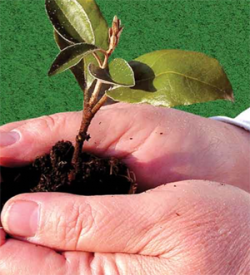Grow Dat!
Farm program for teenagers cultivates four acres in City Park
 More and more elementary and middle schools have made room on their grounds for gardens. But there are few such opportunities for high school students. A meeting between Tulane president Scott Cowen and Alice Waters, the founder of Berkeley’s Edible Schoolyard, planted the seed for the Grow Dat Youth Farm. Johanna Gilligan was brought on to create a farm program aimed at older students. Grow Dat launched last year with a pilot program of 11 students from the New Orleans Science and Math High School. This year, students from six schools will work on Grow Dat’s new permanent farm at City Park. Gilligan spoke to New Orleans Living magazine about how farming teaches job and life skills.
More and more elementary and middle schools have made room on their grounds for gardens. But there are few such opportunities for high school students. A meeting between Tulane president Scott Cowen and Alice Waters, the founder of Berkeley’s Edible Schoolyard, planted the seed for the Grow Dat Youth Farm. Johanna Gilligan was brought on to create a farm program aimed at older students. Grow Dat launched last year with a pilot program of 11 students from the New Orleans Science and Math High School. This year, students from six schools will work on Grow Dat’s new permanent farm at City Park. Gilligan spoke to New Orleans Living magazine about how farming teaches job and life skills.
What is the Grow Dat Youth Farm?
Our mission is to nurture a diverse group of young leaders through the meaningful work of growing food. We really believe that farming and growing food is a great lens for developing a wide array of skills among teenagers: communication, problem solving, ability to work on teams and to work across differences.
What makes Grow Dat unique among other after school programs?
There aren’t many job training programs that bring together youth from different socio-economic and racial backgrounds in this city. Even though they may be coming from different backgrounds, one thing they have in common is that they probably have not farmed before. It becomes a bonding experience for them. Part of what’s exciting about the project is that it exposes young people to traditional food ways, like growing food and cooking food. It also teaches about the cycles of life and death and what it means to take care of something and nurture it.
How does Grow Dat ensure that it has a diverse group of students?
We very strategically identify our partner schools, so we make sure that we’re working in private schools, chartered public schools and public schools. We have a specific goal that 20 percent of the students have already demonstrated leadership skills, so they can model those for the other students. Twenty percent are at risk students. And 60 percent are middle of the road students who don’t get a lot of attention because they’re neither causing problems nor excelling. We’ve found that 60 percent has the most growth potential in our program.
How long do the students stay involved with Grow Dat?
It’s a 20-week program. They begin in late January and graduate in June. The first 16 weeks happen while they’re in school, so they work with us one day a week after school and then on Saturdays for seven hours. Then they transition to a four-week summer program, where they’re with us four days a week, seven hours a day.
How much does Grow Dat pay them?
Up to $1,550. For a lot of them, it’s their first job experience. Being a farmhand is pretty straightforward, but it offers great opportunities for all these lessons about how to work together. They go through a financial training program. They have cooking classes and nutrition classes.
What happens to the food that you grow?
We have a four acre site in City Park. We’ve tilled up one acre of land that we’re going to put in production in January with a goal to grow 10,000 pounds of food with this crew of youth. An ambitious goal. We’ll sell 60 percent to markets and restaurants. Forty percent will go to a variety of donation sites. We also send home produce with the youths, because we want them to always have access to the food they’re growing.
What is Grow Dat’s relationship with Tulane?
The university is retooling and finding ways to support social innovation in the city. They’re incubating us in our initial launch over the first several years. They want to provide real world learning opportunities for their students. It’s been a great partnership because our goals align perfectly.
What kind of resources has Tulane provided?
The partnership dramatically increases the capacity of what would otherwise be a very small nonprofit. So, for example, the Tulane City Center is designing and constructing all of our buildings. We’re working with the school of public health with our evaluations. I’m working with a team of MBA students, who are helping us write our farm business plan. We have a lot of undergraduate students come through that do actual farm work. We’ve been able to identify the ways we need support, and the university has been so generous in getting us connected to those technical resources.
Why do you think urban agriculture has become so popular?
In New Orleans, specifically, I think that post-Katrina everyone wanted to feel more control over the basic things that bring them life: shelter and food.
On December 14, Grow Dat Youth Farm hosts an open house “Farm Warming” from 6 p.m. – 9 p.m. For information, visit www.growdatyouthfarm.org.
– TODD A. PRICE
